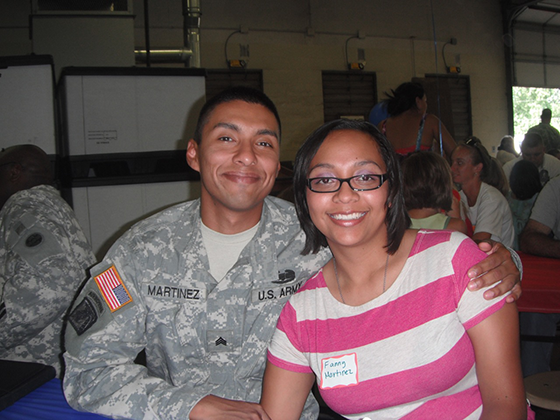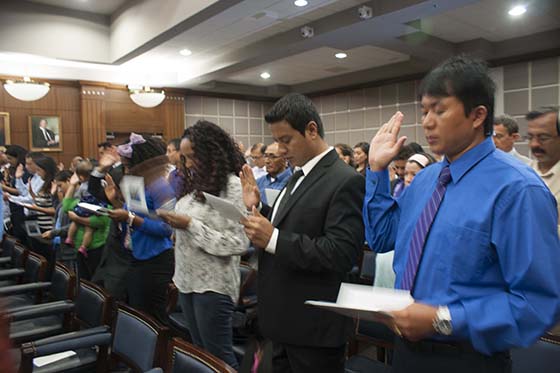An Undocumented Military Spouse: The Story of Fanny Lopez
“When Our Troops Serve, Their Families are Serving, Too.” So says the slogan of Joining Forces, First Lady Michelle Obama’s national initiative to bring attention to the needs of military families. But what happens if a family member is undocumented? Does this mean that they are serving their country any less?
This was the challenge faced by Fanny Lopez, the wife of U.S. citizen David Martinez, a member of the Army Reserve. After their marriage in 2008, David hoped to sponsor his new wife for a green card, but Fanny was ineligible because she had entered the United States without authorization as a child.

“So, why are you still undocumented?” Fanny was often asked. Her friends and family could not believe that an army wife was struggling to get a green card. After all, it is expected that being married to a U.S. citizen should automatically grant you legal status, even more if your spouse is fighting for our country.
Two years after they married, David was deployed to Afghanistan with his reserve unit. He left the United States with uncertainty about what would happen to Fanny while he was gone. He was stationed thousands of miles away from his wife and felt powerless to help. This stress weighed heavily on him and at times distracted from his mission. Fanny also felt the stress of her husband’s deployment.
“My world turned upside down. I started thinking about all of the things that could happen while he was gone,” said Fanny.
While David served on the front lines, Fanny was home worrying not only about her husband’s safety, but also about her own because she knew that she could be deported at any time. Yet Fanny continued to provide emotional support for David and tried not to show her concern.
“We are constantly reminded that our husband’s mental and emotional readiness depends on us,” said Fanny.
In addition to her other responsibilities, Fanny was also an excellent college student. One of her professors, who knew of Fanny’s situation, sent her an article from the New York Times that discussed an internal memo from the U.S. Citizenship and Immigration Services about a little-known process called parole in place (PIP). This program provides a path to a green card for undocumented immediate family members of U.S. military personnel. The aim of the program is to promote family unity and secure the readiness of the soldiers.
David needed to be in the U.S. at the time of application, which was impossible while he was stationed in Afghanistan. So while he was gone, Fanny researched the complicated process and waited for David to return home safely.
“Back in 2010, there was almost no information about PIP and the application process,” said Fanny. “It was so uncommon that even immigration lawyers had no knowledge that it existed.”
 A year later, David returned home uninjured. But as with many veterans, David had a difficult time readjusting to civilian life. He leaned on Fanny for support but also worried about her future in the United States. Fanny remained strong for her husband because she knew that, regardless of the situation, undocumented family members are still expected to support their soldiers.
A year later, David returned home uninjured. But as with many veterans, David had a difficult time readjusting to civilian life. He leaned on Fanny for support but also worried about her future in the United States. Fanny remained strong for her husband because she knew that, regardless of the situation, undocumented family members are still expected to support their soldiers.
At the same time, Fanny and David hired a lawyer, Isabel Martinez, who helped them research parole in place. Together they fought through the maze of red tape for a year and a half. In September 2013, they succeeded in getting her green card.
Fanny and David believe that regardless of her immigration status, as an Army wife, she has provided a service to this country.
“Our soldiers have fought for this country and the least they deserve is to have the certainty that their families will be protected no matter where they are,” said Fanny. “After all of our sacrifices, our service to this country must be honored.”
Today, Fanny is no longer at risk of being deported, but she worries about other undocumented immigrants, including her close relatives and friends, who face the threat of deportation and separation from their families. She continues to work with immigrant rights organizations that fight to stop deportations and seeks to empower undocumented immigrants in the Chicago area.
“It is unacceptable that we have to deal with a broken immigration system,” she said. “We all deserve a chance to live free from the fear of deportation. We all deserve resources that will allow us to provide a better life for our families.”
 Want to show your support for Fanny and the millions like her? Sign our petition to let the president know the time for administrative immigration relief is now!
Want to show your support for Fanny and the millions like her? Sign our petition to let the president know the time for administrative immigration relief is now!


